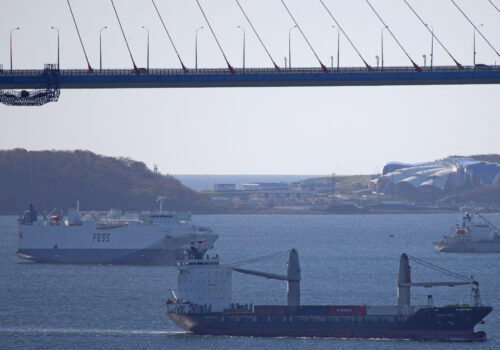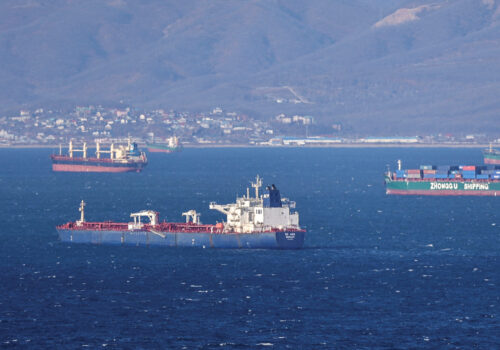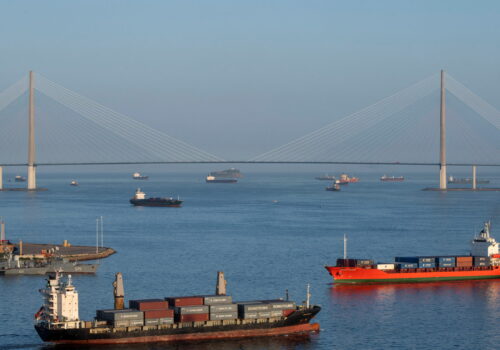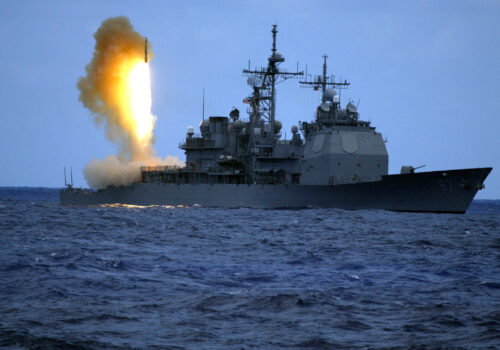Private industry should step up to protect the global maritime order
Bottom lines up front
- Safe oceans are indispensable for the functioning of modern economies.
- Ocean safety is under severe strain, like the rest of the rules-based international order, not least because major nations actively undermine it.
- The maritime industry is directly affected by the deterioration of the maritime order—as demonstrated, for example, by the continued growth of the shadow fleet—and should step up to protect it.
The global maritime order is an impressive but delicate construct. It depends on countries’ and companies’ willingness to abide by rules established through international treaties, even though violating them incurs only minor punishment, if any. In recent years, a growing number of countries have begun to publicly and repeatedly violate maritime rules. This poses the urgent question of who should protect the maritime order. The maritime sector—which is, by definition, dependent on the maritime order—can agree to create new rules, and such rules will likely become necessary. Clearly, corporate governance of the high seas cannot replace intergovernmental governance but, through smaller measures, the maritime domain’s different sectors can help prevent further deterioration of the maritime order.
A brief maritime history
“I am indeed lord of the world, but the Law is the lord of the sea. This matter must be decided by the maritime law of the Rhodians, provided that no law of ours is opposed to it.” This is how Emperor Justinian quotes, in 533, the first-century Emperor Antoninus on the matter of plunder following a shipwreck.1Nicholas Joseph Healy, “Maritime Law,” Britannica, last visited July 23, 2025, https://www.britannica.com/topic/maritime-law. The island nation of Rhodes, a maritime leader, had pioneered maritime rules later adopted by the Romans. Subsequent generations of rulers in Spain, Portugal, Sweden, and Italian city-states developed their own maritime rules, but these rules, naturally, covered only the waters the countries considered theirs.
In 1609, the Dutch legal scholar Hugo Grotius advanced the new concept of the free seas: The oceans should be considered international territory, open to ships from all the world’s nations.2Knud Haakonssen, “The Free Sea,” Liberty Fund, 2004, https://scholar.harvard.edu/files/armitage/files/free_sea_ebook.pdf. The world’s nations, however, were not interested in establishing free sees, and danger continued to plague seafaring. The most successful trading nations were those that could protect their own shipping on the high seas. From the 1690s, Great Britain massively expanded its merchant shipping by investing significantly in the Royal Navy.3James Davey, “British Mercantile Trade and the Royal Navy During the Long Eighteenth Century,” British Online Archives, January 10, 2025, https://britishonlinearchives.com/posts/category/contextual-essays/856/british-mercantile-trade-and-the-royal-navy-during-the-long-eighteenth-century. This model proved exceptionally successful, but it was also costly.
Indeed, by the beginning of the 1900s, it was clear to both the United Kingdom and other countries that individually protecting one’s merchant fleet was unsustainable and governments needed to agree on a basic set of rules to make the high seas somewhat safer for merchant shipping. The treaties, rules, and conventions that followed have allowed maritime operations to expand at a phenomenal rate. These are the International Convention for the Safety of Life at Sea (SOLAS), adopted in 1914; the International Convention on Civil Liability for Oil Pollution Damage (CLC), adopted in 1969; the Convention on the International Regulations for Preventing Collisions at Sea (COLRED), adopted in 1972; the International Convention for the Prevention of Pollution from Ships (MARPOL), adopted in 1973; the International Convention on Maritime Search and Rescue (SAR), adopted in 1979; and, of course, the United Nations Convention on the Law of the Sea (UNCLOS), which was adopted in 1982 and is considered the constitution of the oceans.4Elisabeth Braw, “From Russia’s Shadow Fleet to China’s Maritime Claims: The Freedom of the Seas Is under Threat,” Atlantic Council, January 23, 2025, https://www.atlanticcouncil.org/in-depth-research-reports/report/from-russias-shadow-fleet-to-chinas-maritime-claims-the-freedom-of-the-seas-is-under-threat/#treaties. The members of the International Maritime Organization (IMO) and International Labor Organization have adopted further rules, such as the International Safety Management Code, which de facto requires that shipping companies have a licence.5“The Principal Regulations Governing Maritime Safety,” International Chamber of Shipping, last visited July 23, 2025, https://www.ics-shipping.org/shipping-fact/safety-and-regulation-the-principal-regulations-governing-maritime-safety/#:~:text=ISM%20(The%20International%20Safety%20Management,ships%20and%20their%20managers%20ashore.
In addition, the shipping industry has introduced its own rules to further increase safety for those involved, and it regularly provides input to intergovernmental bodies. “There are many kinds of technical input: how the industry works, what kind of rules will work to ensure that the measures being planned are sensible and effective,” noted Svein Ringbakken, managing director of the maritime war-risk insurer DNK.6Interview with the author, July 3, 2025. “Governments and intergovernmental bodies don’t always have full insight into how things work, so on particular issues they consult industry. And within national delegations and international organizations like Intertanko, the International Chamber of Shipping and so on, industry representatives are regularly asked to provide input because they know the situation on the ground.” The undersea infrastructure, fishing, and oil and gas sectors—other key ocean operators—operate in the same manner. For example, the International Cable Protection Committee represents nearly all owners of undersea cables and issues rules for members to follow.
These generations-long efforts made the oceans safer than ever before. In 2024, an estimated 403 seafarers died in connection with their work, including ninety-one men overboard. No comprehensive records exist from a century earlier, but anecdotal evidence suggests seafarer deaths around that time were tragically common.7“Global Register of Fatalities at Sea: Experimental Data Collection,” International Labour Organization, April 7–11, 2025, https://www.ilo.org/sites/default/files/2025-04/STCMLC-2025-Information%20document-EN.pdf. However, that trend toward more intergovernmental agreements and more safety on the high seas is reversing.
‘Broken windows’ on the seas
As noted in previous reports by the Atlantic Council’s Maritime Threats initiative, compliance with maritime rules has decreased markedly in recent years and continues to do so. Russia’s use of the shadow fleet is only the latest example of a country violating maritime rules.8Elisabeth Braw, “The Threats Posed by the Global Shadow Fleet—and How to Stop It,” Atlantic Council, December 6, 2024, https://www.atlanticcouncil.org/in-depth-research-reports/report/the-threats-posed-by-the-global-shadow-fleet-and-how-to-stop-it/; Elisabeth Braw, “From Russia’s Shadow Fleet to China’s Maritime Claims: The Freedom of the Seas Is under Threat,” Atlantic Council, January 23, 2025, https://www.atlanticcouncil.org/in-depth-research-reports/report/from-russias-shadow-fleet-to-chinas-maritime-claims-the-freedom-of-the-seas-is-under-threat/. (Exporting oil sanctioned by some countries does not violate maritime rules, but not using port state control to detain ships with multiple defects does. Port state control (PSC) “is the inspection of foreign ships in national ports to verify that the condition of the ship and its equipment comply with the requirements of international regulations and that the ship is manned and operated in compliance with these rules.”)9“Port State Control,” International Maritime Organization, last visited August 10, 2025, https://www.imo.org/en/ourwork/msas/pages/portstatecontrol.aspx. Iran’s indirect support of the Houthis’ attacks on shipping in the Red Sea is another troubling development for the global maritime order, as is China’s maritime harassment of civilian vessels in the South China Sea. Beijing’s construction of artificial islands in the South China Sea, and its unilateral declaration of a “no-sail zone” in a part of the Yellow Sea where China’s exclusive economic zone overlaps with that of South Korea, are further examples of recent activities that undermine the global maritime order.10“South Korea Says Concerned by China’s ‘No-Sail Zone’ in Overlapping Waters,” Korea Herald, May 24, 2025, https://www.koreaherald.com/article/10494664.
Like broken windows in a neighborhood, unaddressed maritime rule violations encourage further rule violations. As noted in a previous Maritime Threats report, proliferating rule violations risk creating two parallel maritime systems: one in which internationally agreed-upon rules apply and are obeyed by authorities and companies, and another one in which they no longer apply.11Braw, “From Russia’s Shadow Fleet to China’s Maritime Claims.” The latter is also a world in which companies can save costs. For example, maintenance and repairs obligated by PSC inspections involve expenses, as does crew welfare. Operating in a minimum-rule environment will, however, cost them in the long run.
That makes thwarting this trend a crucial task. The question is for whom. No nation can, on its own, shore up the maritime order; on the contrary, doing so must involve the rest of global maritime community acting collectively. This has been done before. When pirates plagued the waters off the Horn of Africa in the late 2000s, nations from around the world (including the United States, European Union (EU) countries, and China) successfully formed anti-piracy initiatives. Rooting out maritime violations by major nations is naturally a much more challenging undertaking, one that is made even more difficult by the fact that the United States—the default custodian of the global maritime order—has not ratified UNCLOS.
In addition, to adopt measures such as greenhouse gas reduction agreements, the community of nations will likely need the support of China and other nations known to violate maritime rules. When the IMO Marine Environment Protection Committee met in London in April 2025 to negotiate and vote on an agreement to reduce the shipping sector’s greenhouse gas emissions, China voted in favor of the agreement, as did the EU’s member states, the United Kingdom, and a host of other nations, while the United States voted against it.12Elisabeth Braw, “The World Needs a Maritime ‘Elite League’ to Combat Rogue Shipping,” Atlantic Council, June 5, 2025, https://www.atlanticcouncil.org/in-depth-research-reports/issue-brief/the-world-needs-a-maritime-elite-league-to-combat-rogue-shipping/. A few days later, the United States unilaterally announced that it would allow seabed mining in international waters.13“Statement on the US Executive Order: ‘Unleashing America’s Offshore Critical Minerals and Resources,’” International Seabed Authority, April 30, 2025, https://www.isa.org.jm/news/statement-on-the-us-executive-order-unleashing-americas-offshore-critical-minerals-and-resources/; “Unleashing America’s Offshore Critical Minerals and Resources,” White House, April 24, 2025, https://www.whitehouse.gov/presidential-actions/2025/04/unleashing-americas-offshore-critical-minerals-and-resources/. The International Seabed Authority, an independent United Nations organ, does not (yet) permit seabed mining, and its secretary general has said that “any unilateral action would constitute a violation of international law and directly undermine the fundamental principles of multilateralism, the peaceful use of the oceans and the collective governance framework established under UNCLOS.”14Tom LaTourrette and Douglas C. Ligor, “New Turmoil in Regulating Deep Seabed Mining on the High Seas,” Modern Diplomacy, April 27, 2025, https://www.rand.org/pubs/commentary/2025/04/new-turmoil-in-regulating-deep-seabed-mining-on-the.html.
In parallel with these developments, Russia’s invasion of Ukraine prompted Western governments (including the Joe Biden administration) to conclude that the maritime industry could be deployed to try forcing Russia to end the war. In December 2022, Western governments imposed a price cap of $60 per barrel on Russian oil. They considered the sanction especially potent because it didn’t just bar shipping companies based in the sanctioning countries from transporting the oil; it also barred Western protection and indemnity (P&I) insurers—which insure 90 percent of ocean-going tonnage—from insuring shipments above the cap.15“Collectively Stronger: New International Group Chair,” International Group of P&I Clubs, last visited July 23, 2025, https://www.igpandi.org/. Because P&I coverage is required for all merchant vessels, the governments reasoned that Russa would not be able to sell its crude above the price cap and, thus, would be unable to raise large amounts of revenue to use in its war against Ukraine. The maritime insurance industry would shore up the rules-based international order where Western governments could not. The plan failed because Russia turned to the shadow fleet, undermining the maritime order in a way Western governments had assumed it would not.
In a geopolitically flavored maritime development of a different kind, in April 2025 the US government issued a final notice in its 301 Investigation on “China’s Targeting the Maritime, Logistics, and Shipbuilding Sectors for Dominance.” The government announced actions that “will impose significant new port service fees on vessels that are owned or operated by China-linked entities, most vessels that were built in China but that are owned and operated by non-Chinese entities, and all foreign-built vehicle carriers.”16Ian Saccomanno, Earl Comstock, and Gregory Spak, “USTR Issues Final Section 301 Actions in China Shipbuilding Investigation” White & Case, May 12, 2025, https://www.whitecase.com/insight-alert/ustr-issues-final-section-301-actions-china-shipbuilding-investigation. Line Falkenberg Ollestad, an adviser at the Norwegian Shipowners’ Association, said that “puts the maritime sector in the middle of geopolitical rivalry. This is an industry that makes its decisions based on business efficiency, not geopolitical considerations. Now those worlds are colliding.”17Interview with the author, July 9, 2025.
She added: “Shipbuilding has become a new geopolitical hot topic. It’s unsurprising considering that countries have begun taking supply chains much more seriously, but frequently policymakers struggle to understand how the maritime industry works. The maritime industry is very adaptable, but the prime objective will always be to be as efficient as possible, which is why we have cost-effective global shipping. Striking that balance will be a core task for the maritime industry over the next decade.”18Interview with the author, July 9, 2025.
This state of affairs, in which geopolitical tensions co-exist with commercial links established during more harmonious times, exposes the maritime sector to a range of geopolitically linked risks and pressures (as detailed in previous Maritime Threats reports).19Braw, “The Threats Posed by the Global Shadow Fleet—and How to Stop It”; Braw, “From Russia’s Shadow Fleet to China’s Maritime Claims.” The situation also has a less obvious upshot. With governments increasingly unable to reach international agreements, the maritime sector might have a better chance to reach global agreements. The maritime sector—which includes not just shipping but also ports, undersea infrastructure, and maritime insurance—might, in fact, be the world’s best chance at shoring up the crumbling maritime order precisely because it focuses on efficiency, which requires the high seas to be safe for commerce.
The obvious question is how. Companies would naturally not be willing or able to negotiate sweeping conventions like UNCLOS, but they have potential to address more limited matters. For example, should IMO member states fail to adopt the greenhouse gas reduction agreement passed by the Environment Protection Committee, the shipping industry could conceivably agree on greenhouse gas emission rules without governmental involvement. To be sure, plenty of shipping companies have no interest in tackling climate change, but most know that their industry must bring down its share of global carbon-dioxide (CO2) emissions. “The shipping industry is split on the issue,” Ringbakken said. “In northern Europe, shipping companies are mostly on board with CO2 reductions, while elsewhere there’s less support, but by and large decarbonization of the shipping industry is moving ahead. Some of the largest companies are taking the lead, and leading customers are demanding CO2 reduction too.”20Interview with the author, July 3, 2025. Indeed, if European and other countries that are serious about CO2 reduction were to adopt stricter emission rules for ships calling at their ports, the global shipping industry would likely act pragmatically and adopt sector-wide rules.
Could the oceans’ different industries—shipping, undersea infrastructure, and other maritime operations such as oil extraction—also negotiate and adopt other measures to ensure the high seas remain safe during a period in which the world’s nations are unlikely to reach any agreements? In other words, could the oceans’ practitioners become back-up protectors of the maritime order, the actors who step in when natural protectors—key nation-states—signal that they are not going to protect it? “When it comes to the risk of piracy, the maritime sector already has industry-wide standards,” Falkenberg Ollestad said.21Interview with the author, July 9, 2025. “On more complex issues, it becomes more difficult, but what the industry does agree on is the importance of navigational freedom. If countries were to begin challenging that, you could see the global shipping industry join forces to try to protect it.” Long before such a point is reached, the maritime industry’s different sectors could collectively adopt more standards and agreements on less complex issues such as greenhouse gas emissions or safer scrapping of vessels.
Whether corporate intervention to protect the maritime order would be a desirable development is debatable, but this matters less than the fact that it might become inevitable. The global maritime order is only viable if a critical mass of actors honor it and introduce new measures that plug existing holes. As practitioners on the high seas, shipping companies, undersea-infrastructure companies, oil and gas companies, and others have an obvious interest in maintaining the maritime order.
It would, of course, also be a risky development, as companies would be acting in a capacity otherwise mostly reserved for governments. Matters such as the definition of territorial waters and exclusive economic zones will, of course, always remain a matter reserved for nation states, as will interventions against rule breakers. By creating additional rules and standards, the maritime industry would build on the private sector’s well-established practice of creating industry-specific rules and standards beyond those contained in intergovernmental agreements. For example, the cable industry itself has established rules and procedures for the installation and repairs of undersea cables.
Should the maritime order deteriorate to the point at which freedom of navigation is challenged—not just in a limited number of waters like the Red Sea but more widely—the global shipping industry could, for example, negotiate industry-wide rules to protect merchant vessels from attacks or collectively reroute from waters where freedom of navigation is not guaranteed. If the shipping industry were to collectively inform the Houthis that shipping through the Red Sea will be suspended unless the Houthis cease their attacks, this would send a powerful message because the Red Sea’s coastal states depend on at least some ships calling at their ports.
One area that needs urgent attention is the security of undersea infrastructure: data cables, power cables, and pipelines. While NATO and Taiwanese authorities have increased their patrolling of undersea infrastructure following a string of suspicious cable incidents, governments will not be able to deter every potential saboteur. Data-cable owners could, for example, agree to take over each other’s traffic in situations where several cables have been damaged. (Cable owners typically install cables in pairs, with the twin cable taking over the damaged cable’s traffic in case of damage, but there is no arrangement covering traffic in cases where both cables are damaged.)
This would naturally involve working with competitors; indeed, given intergovernmental authorities’ current weakness, companies’ efforts would be most productive if coordinated by industry bodies. The satellite industry offers a partial example collaboration in a similar vein. Satellite companies mutually report incidents via an industry-wide body, the satellite equivalent of drivers receiving warning of accidents ahead. They do so on the basis of trust, as each report goes to their competitors, and the service is crucial because it allows the satellite industry to operate as safely as possible.
From companies’ perspectives, shoring up the maritime order would indisputably be an additional and unwanted burden. But because no one depends more on a functioning maritime order than the maritime industry itself, the maritime domain’s different sectors might find that taking on this additional task is preferable to watching the maritime order deteriorate further.
Conclusion
The global maritime order is one the world’s most important intergovernmental achievements, and it is indispensable for the functioning of modern economies. However, like other parts of the rules-based international order, it is under severe strain, not least because major nations actively undermine it. Because the maritime industry is directly affected by the deterioration of the maritime order—as demonstrated, for example, by the continued growth of the shadow fleet—it is in the industry’s interest to protect the maritime order where governments can no longer reach agreements.
About the author
Featured project
Related content
Explore the program

The Transatlantic Security Initiative aims to reinforce the strong and resilient transatlantic relationship that is prepared to deter and defend, succeed in strategic competition, and harness emerging capabilities to address future threats and opportunities.
Image: A crane lifts a shipping container on the quay side of Dublin Port container terminal in Dublin, Ireland, May 25, 2023. REUTERS/Phil Noble.





